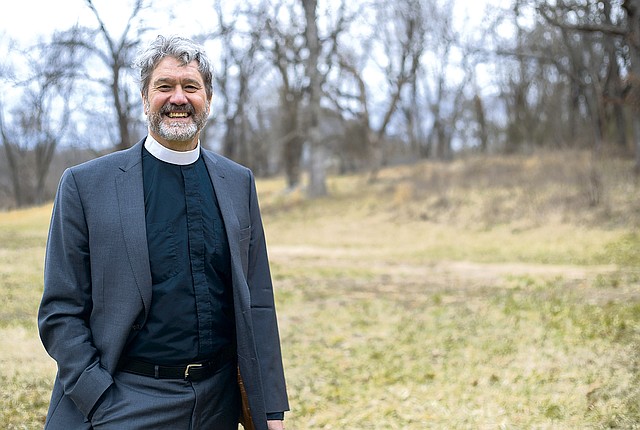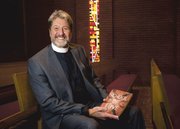Pastor's book reflects on church's founding, work for social justice
The Rev. Roger Joslin, vicar of All Saints’ Episcopal Church in Bentonville, stands on land slated for the construction of a multi-faith facility where Christians, Jews and Muslims will worship together in Bentonville.
Saturday, February 20, 2016
Roger Joslin tells a love story -- the love of his church, his congregants, his community and everyone's God.
The Rev. Roger Joslin serves as the vicar of All Saints' Episcopal Church in Bentonville. In his new book, School of Love: Planting a Church in the Shadow of an Empire, released late last year by Morehouse Publishing, he tells the story of his church, founded as a mission of the Diocese in Arkansas in 2007.
School of Love
Author: Roger Joslin
Publisher: Morehouse Publishing
Year: 2015
Cost: $19.16 (Amazon)
All Saints website introduces the church as a "church without walls. Literally, in the sense that we do not yet have a fixed meeting place, and figuratively, in the sense that we are open, inclusive and welcoming of all God's children," reads the site. The All Saints services -- both English and Spanish -- meet weekly at Christ the King Lutheran Church in Bentonville.
"The epiphany came to me one Sunday when I stood in the altar and looked out over the sea of people that comprised the All Saints' congregation," Joslin writes in his book. "They were rich, poor, black, white, brown, gay and straight. I suddenly realized, this is what the kingdom of God looks like."
"In the Book of Revelation, we read how 'the one who was seated on the throne,' says, 'See, I am making all things new,'" Joslin continues. "Seeing all things new is part of the great joy of a church plant. Every Sunday ought to feel like springtime. There is no telling what plant will begin to bud or what idea will soon hatch.
"But then there is this pesky business of the new commandment: Love one another."
EVERYONE WELCOME
Joslin reveals his path as a planter: baptized a Baptist in Texas, hauling hay and surfing in Southern California, feeling disenchanted as he registered for the draft during the Vietnam war, researching government in Britain as graduate student, working with wood as a 20-year career, serving as an active lay person in the Episcopal church and finally answering the call.
A friend's suggestion led him to the Episcopal Church and another's led him to Arkansas. The friend sent a letter "to then-Bishop Rt. Rev. Larry Maze, telling him of an older-than-average seminarian, with more than a few scars in life, who possessed an entrepreneurial bent that might be useful in the Diocese of Arkansas," Joslin shares.
Joslin reflects on his process of ordination: "For a year, I met with yet another Commission on Ministry, which I think finally concluded that I had been damaged and healed in ways that might have taught me enough about compassion to properly serve people. ... Finally, a battery of psychological tests revealed I might just be crazy enough to take on the task of planting a church in Bentonville. ... The bishop directed me to go to Benton County to plant a progressive church."
But the book is not about Joslin; rather, he reviewed his journal as a starting point for the book. In School of Love, Joslin shares his inspirations and reflections on his experiences and his beliefs in inclusion and social justice for all. "In the beginning, I knew it would be an interesting project, planting a church in Bentonville," he said in an interview this week. "Often, I kept a journal, taking notes on things that happened. I realized they would be important documents for the people of the congregation."
Joslin likens the epiphany about his congregation to another epiphany. "It was an epiphany not unlike the appearance of these three foreign magicians from the east to the Christ Child," he writes. "The epiphany was a sign that Christ's coming wasn't meant just for a tiny Semitic tribe of wanderers, but that the entire world might be saved.
"Because of the international commerce of Walmart, it is a good fortune in Northwest Arkansas to have travelers from the east, west, north and south. Like the wise men, these newcomers arrive bearing gifts of their culture, their language and their heritage. It is a real privilege -- like that of the Christ Child -- to receive these gifts from foreign lands and to share the overwhelming joy of the wise men."
Joslin writes that All Saints grows thanks to its message of "radical hospitality." Many find a home here, when they had been turned away by others. "One of the best things about my job is I get to say, 'Yes,'" Joslin says.
"We accept people as they are," he writes. "And this is just what Jesus did. He reached out to the people on the margins, to those that society found unacceptable. Jesus embraced the prostitutes, the tax collectors and the poor. It is easy to love people who are just like ourselves, but Jesus asks us to do more. Jesus asks us to love people who are different from us. Progressive church plants must be sure to spread this message."
SUBTLE INFLUENCE
"Bentonville is the home of what is perhaps the most powerful corporation in the world," Joslin writes elsewhere in the book. "Materialism is the order of the day. Great wealth and financial struggle exist side by side. Racism and homophobia are ugly realities.
"This is a church-going community, but one that is dominated by biblical literalism," he continues. "Here, in the midst of all the above, is All Saints' -- an upstart of a church that boldly proclaims that all God's children are welcome just as they were created and dares to suggest that God wants us to use our brains as well as the Bible to understand what God is saying to us. This is a community that cares about the environment and seeks justice for all creation. It is a parish that seeks social change and risks being transformed in the process.
"While I had no intention of throwing verbal hand grenades upon my arrival in Bentonville, I was fairly certain that my presence in this small town would be unsettling to many of its residents," Joslin reflects.
Shortly after he arrived in Bentonville, Joslin discovered that prisoners in the Benton County Jail received nothing but cold sandwiches for their meals. He led his parishioners through a seven-year campaign, which finally resulted in a new sheriff and a new contract for hot meals for the inmates.
Joslin writes another small cheer of victory when Walmart raised the hourly pay rate for its lowest-paid employees. Some All Saints parishioners had been involved in making that life-changing decision.
"Like every other church in Bentonville, we have lots of Walmart employees and their vendors [as members of the church]," Joslin said in the interview. "And the same way that Walmart prospers, we enjoy the prosperity around us with the amenities -- the trail system, museums, nice restaurants. They wouldn't be here without Walmart.
"We are aware, that as a church, we follow the Gospel of Jesus Christ, and we try to encourage the members of our parish to make choices for the good of mankind. As we follow the call by God, we have a unique opportunity [for influence, being close to the headquarters of one of the world's largest corporations]."
"Imagine the meetings of the minds of Bentonville executives [those of Walmart and its vendor companies] intent on changing the system that could find creative avenues for providing health care for everyone who needs it," he writes. "Or imagine if all these companies that do business with Walmart could recognize that climate change is a threat to us all, and then bring the power of their collective imagination to finding ways to reduce their carbon footprint.
"Instead of just railing against government regulation, this little corner of Northwest Arkansas could become the harbinger of a different way of doing business," he envisions.
Joslin feels a responsibility as a man of God to continue and strengthen that influence of the decision makers.
"Jesus was chased out of Nazareth -- not because he was a local prophet, but because he offended the powers that be," Joslin wrote. "Sam Walton remains a hero in Bentonville because of his strong entrepreneurial spirit, his lack of pretension and his honest dealings with others, but he never seriously challenged the dominant culture's conception of how we are to live in the world. Jesus does."
SPIRIT BLOWS
And now All Saints is poised on the "threshold of an exciting endeavor," Joslin said.
Work has begun and a donation offered to build a tri-faith facility in Bentonville, where Christians, Jews and Muslims would worship together. Representatives of these three religions point out that they all worship the same God.
"It's a big deal for who we are as a church," Joslin said of All Saints. "We want to continue to press boundaries about who is included in the kingdom of God. We've got a beautiful path to God as Christians and Episcopalians, but its not the only path to God.
"To meet under the same roof -- for the first time in the history of the world -- sends a tremendous message of love and cooperation in a world that's rife with division. The world needs that."
From the beginning, the Episcopal Church's mission for All Saints' has been "to allow the Spirit to blow where she will," Joslin writes. "And I pray that nothing we establish will ever prevent us from being born of the Spirit. ... My prayer is that churches are always alert to the movement of Spirit and that they can be known in a hundred years as places where anyone can be born again, and again, and again.
"Sometimes, the Holy Spirit moves us in that direction, toward a place wherein we aren't altogether sure we are comfortable," he says. "It is a place of mystery, a place where we experience the unknown, and a place that expands our idea of what is blessed by God beyond the boundaries of what we had previously known.
"To ask for God's presence (in new place) is to ask that God not leave us alone," Joslin continues. "When we ask for God's presence in a place, we should know what we are asking for. While we might expect comfort, reassurance and peace, the presence of God can often bring discomfort, challenge and a push in the direction that we are not sure we want to go.
"We are called to plant the seeds of the kingdom," Joslin concludes. "If the plant grows -- 'First the stalk, then the head, then the full grain in the head' (Mark 4:28) -- it will be accomplished in God's time and by God's hand. As we watch the growth, we will shake our heads in wonder and amazement."
NAN Religion on 02/20/2016

